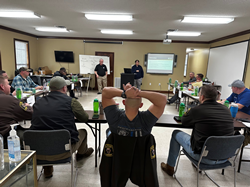
AltaPointe provides evidence-based training to law enforcement to help officers gain knowledge of de-escalation techniques.
It’s important for law enforcement to have the perspective of someone with mental illness or a similar issue. Knowing how that person may feel or react is invaluable knowledge in a crisis.
MOBILE, Ala. (PRWEB)
February 01, 2023
From standoffs to suicide attempts, crisis intervention training provides law enforcement with the tools to manage intense situations.
AltaPointe Health partners with the Alabama chapter of the National Alliance on Mental Illness to bring the 40-hour training to the Mobile area.
“We can provide law enforcement with techniques as to how to talk to those in crisis in a non-threatening, empathetic way to resolve the situation without the use of force,” Cindy Gipson, Ph.D., associate clinical director of intensive adult services at AltaPointe, said.
In addition, training helps keep individuals experiencing a mental health crisis from going to jail or a local emergency department and instead getting intensive help from mental health professionals.
“It’s important for law enforcement to have the perspective of someone with mental illness or a similar issue,” Dr. Gipson said. “Knowing how that person may feel or react is invaluable knowledge in a crisis.”
The evidence-based training developed some 30 years ago works through scenarios that could occur in the field for law enforcement personnel, teaching them how to react and what to do should a similar situation arise on their watch. The modules help trainees gain knowledge of de-escalation techniques, community resources, and other information to help when assisting someone in a crisis.
“If law enforcement feels confident in managing these types of calls, they are far more likely to be effective in helping individuals get the care they need,” Dr. Gipson said.
Capt. Andre Reid with the Baldwin County Sheriff’s Office understands how crisis intervention training can help – especially with the uncertainty that can come with law enforcement response to any situation.
“You just don’t know,” Capt. Reid said. “There’s always some component that may be mixed in, potentially, with every call.”
The training, established in 2021, has been effective in that hundreds of individuals have been brought to AltaPointe’s Behavioral Health Crisis Center instead of jail after an encounter with law enforcement. The vast majority of those have entered a treatment program.
Departments interested in training can contact AltaPointe’s Access to Care at 251-450-2211 to learn more.
For more information about crisis services available at AltaPointe, visit https://altapointe.org/services/crisis-services-overview/.
Share article on social media or email:

